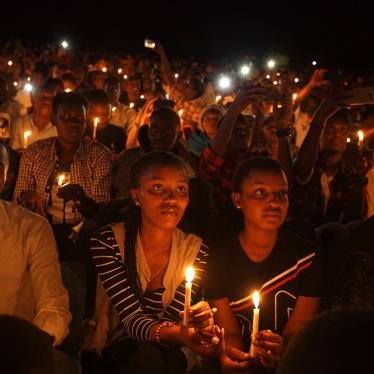(Geneva) – Rwandan authorities are seeking to formalize their abusive arrests and detention of some of the country’s most vulnerable children under the pretense of rehabilitating them, Human Rights Watch said in a report released today. The Geneva-based United Nations Committee on the Rights of the Child, which starts its review of Rwanda on January 27, 2020, should call for the immediate closure of Gikondo Transit Center, where children are arbitrarily detained and abused.
“Rwandan authorities claim they are rehabilitating street children,” said Lewis Mudge, Central Africa director at Human Rights Watch. “But instead, they are locking them up in inhuman and degrading conditions, without due process, and exposing them to beatings and abuse.”
The 44-page report, “‘As Long as We Live on the Streets, They Will Beat Us’: Rwanda’s Abusive Detention of Children,” documents the arbitrary detention of street children for periods of up to six months at Gikondo Transit Center, in Kigali, the capital. It follows three Human Rights Watch reports in 2006, 2015, and 2016 on transit centers, including Gikondo, where ill-treatment and beatings are common. Since 2017, a new legal framework and policies under the government’s strategy to “eradicate delinquency” have sought to legitimize and regulate detention in so-called transit centers. But in reality, this new legislation provides cover for the continuing arbitrary detention of, and violations against, detainees, including children.
Human Rights Watch interviewed 30 formerly detained children ages 11 to 17 between January and October 2019, and reviewed public statements, official documents, publications in state media outlets, Twitter feeds of government officials, and other official sources, as well as the available information produced by the National Commission for Children, the National Commission for Human Rights, and the National Rehabilitation Service.
Under legislation introduced since 2017,people exhibiting “deviant behaviors … such as prostitution, drug use, begging, vagrancy, [or] informal street vending,” can be held in transit centers for up to two months, without any other further legal justification or oversight.
Human Rights Watch found that violations begin as soon as the police or members of the District Administration Security Support Organ (DASSO), a local security force, round up the children off the streets. Some children reported being beaten during or soon after their arrest. Some said that they were given an official statement with the accusation against them, but most said they never received such a document, and none had access to a lawyer, guardian, or family member during their admission.
“If you’re a young girl, they call you a whore,” said a 16-year-old girl who was detained at Gikondo for a month in early 2019. “They stick whatever label on you, don’t say anything about the law, and when they’re done calling you a prostitute, a thief, or a vagrant, they throw you in prison.”
Twenty-eight out of thirty children said they were beaten at Gikondo. “An official at the center … hit me with a big stick on my back and my buttocks when I arrived at the center,” said a 15-year-old boy detained in Gikondo for two months in 2019. “He asked for money, and I didn’t have any. He said, ‘You don’t bring anything even though you live here and benefit from this country!’”
Children at Gikondo are detained in overcrowded rooms, sometimes with adults, in conditions well below standards required by Rwandan and international law. Children said they had to share mattresses and blankets, which were often infected with lice, sometimes with up to four other children. Some said they were allowed to wash only once or twice a week or had irregular access to toilets. Access to medical treatment is sporadic, and there is no rehabilitation support.
Rwanda, which ratified the UN Convention on the Rights of the Child in 1991, said in its July 2018 report to the Children’s Rights Committee: “Children in street situations are not treated as offenders as they are always placed in a transit centre where they are held for a short period before longer term remedial or corrective measures are taken.” However, in practice, there is no judicial process to determine the legality of any of the detentions, the length of time spent at the center, or how children are released or transferred.
Children’s release from Gikondo is also arbitrary. Some children said they were transferred to Gitagata Rehabilitation Center, but most were simply released. They were told they would be rearrested if they returned to the streets, yet given no financial or logistical support to return to their families. Seventeen of the children interviewed said they returned to living on the streets.
The treatment of children in Gikondo violates the African Charter on the Rights and Welfare of the Child and the Convention on the Rights of the Child.
In July 2019, the National Commission for Human Rights, a government-appointed body, visited the center and raised questions regarding the repeated detentions of children living on the street. The commission reported that the director of the center, Potien Sindayiheba Gakwaya, said the underlying issue would not be solved by the transit centers.
The government of Rwanda should shut down Gikondo and end the arbitrary detention practices that lead to people being held in transit centers. It should stop using transit and so-called rehabilitation centers to rid the capital of street children, and replace this abusive system with assistance and support to those who need it, Human Rights Watch said.
Rwandan authorities should release all those detained in Gikondo immediately and set an effective, independent investigation into the Rwanda National Police and other authorities responsible for violations against detainees, including children. The investigation should be capable of ensuring that abusive officials are brought to justice.
“The UN child’s rights committee has an opportunity to do what few in Rwanda can do by asking the government tough questions about its human rights record and systematic treaty violations,” Mudge said. “It should stand by children facing abuse, who deserve to be treated with dignity and respect.”









